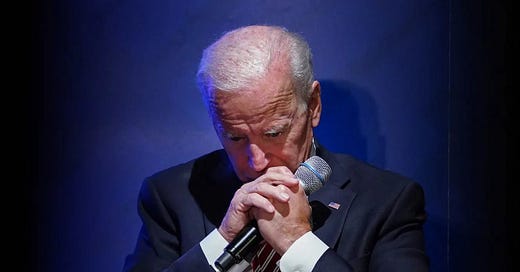Should Joe Stay or Should He Go?
If he goes there will be trouble; if he stays it could be double
To the extent there was ever a chance of driving President Biden out of the race based on intra-party panic and the collective might of elite opinion, that window has closed.
The immediate shock has worn off and the show goes on, even as allies and foes alike survey the damage. Biden intends to hold on, and, at least for the time being, he has virtually unanimous albeit cautious public cover from the party’s leading lights. For now they’ll take it one day at a time with the goal of getting through to the July 4th holiday and a long weekend that can’t come soon enough.
Whether or not that posture is sustainable beyond that depends on the polls. If the first wave of public polling shows movement within the margin of error, a point or two one one direction or the other as with the post-conviction surveys, Team Biden will breath a sigh of relief, the party will fall in line, and both campaigns will reprise the race within its original contours, with Trump sentencing and the Republican National Convention shifting the focus away from Biden by mid-July.
On the other hand, a significant, consistent drop across a range of polls, particularly those in key swing states, would be a disaster for Biden, and almost certainly prompt his family to think about what it would mean for his legacy. That is the easiest way to imagine a choreographed, face-saving exit from the race, the sort floated by Rep. Jamie Raskin (D-MD) this week.
A murky result might be the most excruciating outcome for the party. If Biden’s margin suffers measurably but not catastrophically—say some of his supporters shift back to undecided or minor candidates, but Trump doesn’t gain—the campaign is setting up the argument that this is a “temporary dip,” one driven by “overblown media narratives.” And indeed there’s reason to think that some of the polling hit would be driven by response bias as Dem morale experiences a low ebb.
For Biden to be compelled to leave—and let’s be clear, he and his family will have to be pried away—he’ll have to be convinced by the numbers both that he would lose, and lose badly; and that another specific Democrat will win. For now, the campaign is touting polling showing modest numbers for all would-be nominees, with Biden performing marginally better than the others head-to-head with Trump.
For Democrats more broadly, the question is more complex; assuming Biden would go willingly, does the exit itself boost Democrats’ odds of victory? The more convinced one is that Biden will lose, the more attractive the unknown becomes, especially if it means projecting one’s preferred candidate.
The problem with the current discourse is that it tends to assume rational political actors and systems that will do what is electorally optimal for the party they ostensibly serve. If that were the case, Biden never would have run, instead allowing for an open primary to determine the party’s standard bearer among a host of promising young options. But with no such process to confer the legitimacy befitting a traditional nominee, and no time for the sort of slow burn that would allow a talented upstart to eventually catch fire, the sitting Vice President—a current member of the ticket, and the leader of all available polling on the subject—would walk into the convention hall as the single most likely alternative, whatever her limitations.
With that in mind, my latest in Politico Magazine tells Dems to be clear-eyed about the range of possibilities:
After years of hand-waving concerns of age-related decline, Democrats are waking up to the peril of running an octogenarian candidate. Everyone who watched the presidential debate knows what they saw, and no amount of spin can elide it. The question now facing Democrats is whether they can or should do anything about it. And less than 130 days out from the election, there are no simple answers. No number of grave op-eds or perplexed cable news monologues can change the fact that this decision is Biden’s alone. There is no cabal of insiders capable of engineering a late swap — notwithstanding GOP fears to the contrary — and given the president’s complex history with various party poobahs, an attempted intervention stands to dig him in further. The only counsel he’s apt to heed is that of the close-knit Biden clan, with First Lady Jill and sister Valerie first among equals.
But whatever the odds of persuading Team Biden, would Democrats be better off rolling the dice with someone else? Without a consensus alternative, let alone a strategy to nominate them, the trade is dubious at best. The risk for panicky Dems is trading one self-delusion for another in the form of some imagined dream ticket.
The default candidate would be Vice President Kamala Harris, an understanding that has served as the very subtext for Democrats’ passive-aggressive approach to the age question over the past four years, marked by periodic bouts of pining for a swing state savior. Dems must take a deep breath and ask themselves whether they think Harris has a better chance against Trump; if not, they’d better hope Biden can shake off the debate doldrums, prosecute the case against Trump, and close out the campaign with more good days than bad.
While my brief piece stops short of exploring this calculus further, I recommend this excellent piece from Split Ticket founder Lakshya Jain laying out the case for and against Joe Biden.
It may not make a difference where Democrats come down on this question, but it’s the best way to channel nervous energy until Nate Cohn can render the final verdict.



